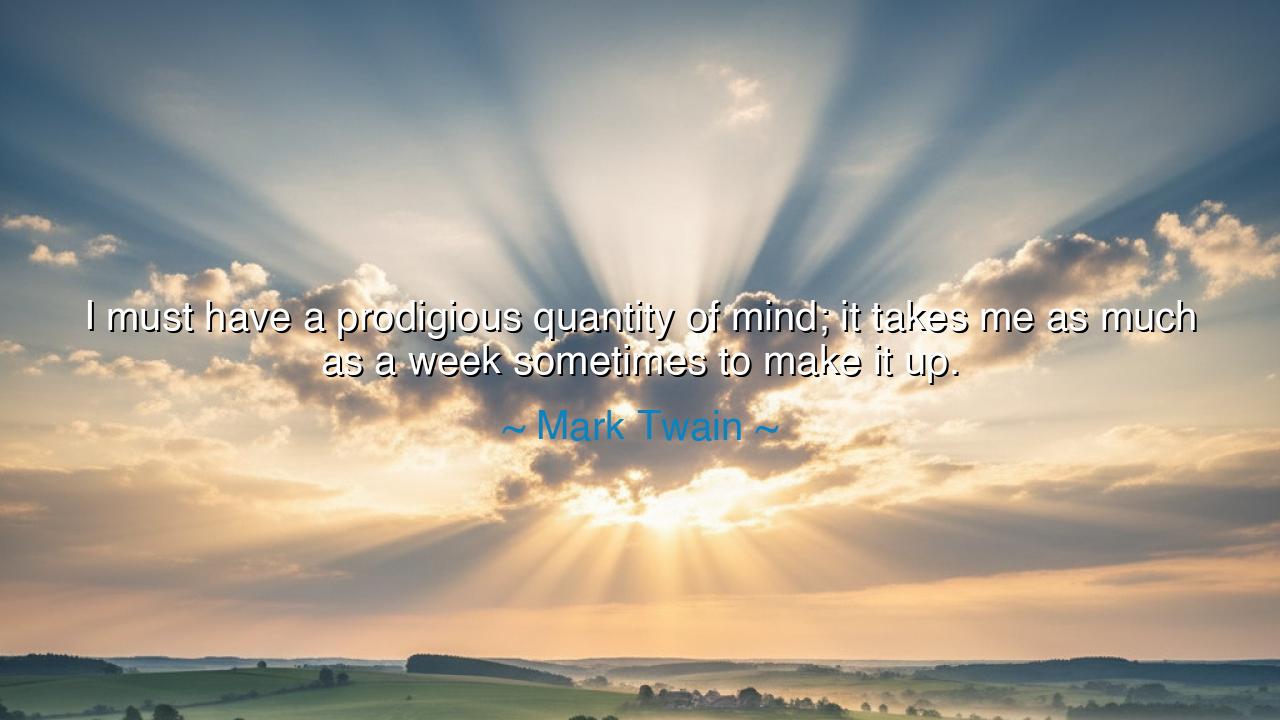
I must have a prodigious quantity of mind; it takes me as much as
I must have a prodigious quantity of mind; it takes me as much as a week sometimes to make it up.






“I must have a prodigious quantity of mind; it takes me as much as a week sometimes to make it up.” Thus jested Mark Twain, the sage of wit and paradox, whose laughter was but another language of truth. Behind his humor lies a mirror held up to the human condition—a reminder that wisdom is not always swift, that thought ripens in the quiet chambers of uncertainty. In this line, Twain mocks himself, yet also honors the sacred struggle of decision, the slow and painful process by which the soul seeks clarity. He suggests, with both irony and grace, that the mind which hesitates may not be weak—but vast.
For those who think deeply do not rush lightly. The surface mind makes up itself in an instant, but the deep mind must wander through the labyrinth of reflection. A prodigious mind weighs, questions, and reconsiders. It doubts, not from fear, but from reverence for truth. Twain’s humor cloaks an ancient wisdom: that slowness in judgment can be the sign not of indecision, but of intelligence. The wise are careful not to harden thought into certainty before its time. They know that a premature decision is like unbaked bread—warm perhaps, but unfit for nourishment.
The ancients taught that to know oneself is the beginning of wisdom. But self-knowledge requires time, and the patience to listen to the many voices within. Socrates, before choosing his path, would question all things—even his own motives—until the truth revealed itself, not as thunder, but as quiet dawn. When he refused to flee Athens, accepting death for the sake of principle, it was not the decision of a moment. It was the fruit of a long and measured mind, one that had weighed the meaning of life, freedom, and duty. So too did Twain’s jest point toward this truth: that to make up one’s mind is not a trivial act—it is the shaping of destiny itself.
In the modern age, men pride themselves on speed. They rush to opinion, to judgment, to action, as if haste were a crown. But Mark Twain, with his wry smile, reminds us that thought cannot be forced. A mind of prodigious quantity must meander, because it holds multitudes. It contains contradictions, curiosities, dreams, and fears. Such a mind cannot leap—it must unfold. It takes time to reconcile its many voices into one clear song. The wise do not fear delay; they fear false certainty.
Yet there is also humor in his confession, for Twain saw the comedy in the human struggle to choose. How many times do we argue with ourselves, pacing in circles, seeking signs from the heavens for decisions as simple as they are profound? In that waiting, that fumbling, that endless reasoning, lies the beauty of being human. To be alive is to be torn between many truths, and to seek, through confusion, the steady thread of wisdom. Twain’s irony hides compassion—for he knows that indecision is not folly, but evidence of the mind’s desire to be right, not merely quick.
Think of Abraham Lincoln, whose melancholy heart was also a mind of immense patience. In the heat of civil war, he often delayed his choices, weighing them from every angle. Many called him hesitant. Yet his hesitance saved a nation, for he did not act from anger or impulse, but from reason seasoned by conscience. His decisions, though slow, were enduring. Such is the mark of a prodigious mind—one that may take a week, a month, or a lifetime to “make itself up,” but when it does, its judgment changes the course of history.
So, my friend, do not despise the time it takes you to think. Let your hesitation be holy. When your heart wrestles with choice, do not mistake the struggle for weakness—it is the proof that your soul is awake. In the stillness of uncertainty, wisdom is forming her words. Take your time to decide, but when you do, decide fully, with heart, with reason, and with honor. The mind that is slow to form may be slow to change, but once set upon truth, it stands unshaken.
And remember Twain’s laughter—not to mock your delay, but to bless it. For in his jest lies comfort: if you take a week to make up your mind, it may be because your mind is worth that much. The prodigious mind is not the fastest—it is the most faithful to the truth it seeks. So be patient, be thoughtful, and when the time comes, act with the calm strength of one who has truly thought, and therefore truly lived.






AAdministratorAdministrator
Welcome, honored guests. Please leave a comment, we will respond soon